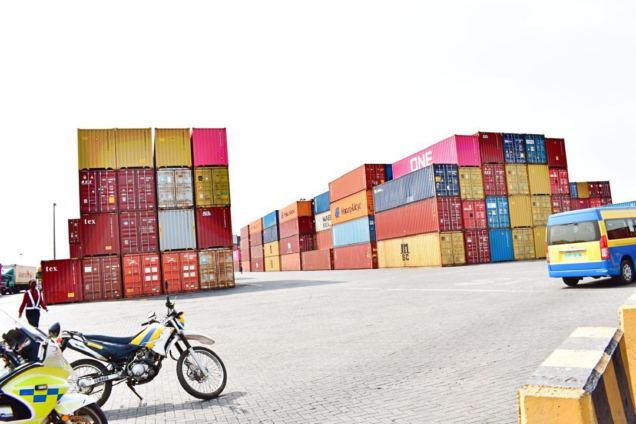The ECG container saga has become the latest scandal rocking the country,
offering a mix of mystery, mismanagement, and massive losses. The situation has
garnered significant attention for its sheer absurdity, as Ghana’s energy
sector faces one of the most puzzling disappearances in recent history.
Thousands of containers went missing at the port under the management of the
Electricity Company of Ghana (ECG), leaving the public in disbelief and the
authorities scrambling to find out what happened.
The story begins with a dramatic twist at the handover between the outgoing New Patriotic Party (NPP) and the incoming National Democratic Congress (NDC). The departing NPP government left behind a note that mentioned 3,000 ECG containers at the port, ready for clearance. However, upon inspection, the Minister of Energy found something entirely different. The containers were far fewer than reported—only 2,500 in total. This was the beginning of a series of mistakes that would escalate quickly into an even larger disaster.
The real mystery began when officials started investigating further,
contacting the Ghana Ports and Harbours Authority (GPHA) to confirm the
numbers. The GPHA responded nonchalantly, stating that only 1,132 containers
could be accounted for. However, ECG officials, caught in their own web of
confusion, insisted they had 2,462 containers on hand. The discrepancy of over
a thousand containers raised eyebrows, leading to a committee being formed to
get to the bottom of the issue.
What followed was nothing short of an embarrassment. The investigation team,
determined to find the missing containers, decided to count the shipments
themselves. In a shocking turn of events, they confirmed the GPHA’s count, and
it was revealed that 1,328 containers had completely vanished from the ECG
inventory.
To make matters worse, the situation surrounding the disappearance of the
containers wasn’t just about lost goods. It involved a financial mess of
astronomical proportions. ECG’s shipping account had been receiving regular
payments, with 5 million cedis per week meant to clear the backlog of
containers. However, in 2022, the company’s managing director, Dubik Mahama,
made the inexplicable decision to stop funding the account, ostensibly to see
what would happen next. What happened was chaos—containers piled up faster than
they could be processed, and the demurrage bills—fees charged for holding
containers too long—began to soar. Within a short period, the demurrage charges
reached 1.5 million cedis.
Despite these mounting costs, ECG seemed paralyzed. The company continued to
import new containers, while its management could not seem to muster the funds
needed to clear the existing stock. Meanwhile, ECG was paying its suppliers
most of the money owed, including a staggering 90% of contract sums, even as it
struggled with its port operations.
To address the crisis, ECG introduced two companies, MINT LOGISTICS and
DAWARDS BOND LIMITED, to assist with clearing the containers. However, this
plan raised eyebrows due to the questionable nature of these companies. MINT
LOGISTICS, with its small staff, was awarded the task of clearing 1,110
containers at a hefty price of 160,000 cedis per container. This led to a total
cost of over 177 million cedis. DAWARDS BOND LIMITED, an even smaller company
with a staff of just one person, was given 200 containers to clear at a rate of
115,000 cedis each, amounting to 23 million cedis.
The bizarre situation continued to spiral out of control, as the missing
containers began to take on an almost mythical status. Rumors swirled about the
contents of the containers disappearing, only to be replaced by new shipments
arriving at the port. There were even whispers that ECG cables had been melted
down and sold to businesses abroad, contributing to the financial chaos.
The scandal didn’t end there. ECG’s procurement department, already in a
state of disarray, became even more dysfunctional. In 2022, the department had
planned to spend 1.7 billion cedis, but actual expenditures were far lower, at
only 460 million cedis. By 2023, the budget had ballooned to 935 million cedis,
but ECG spent an eye-watering 8.3 billion cedis instead—7 billion cedis more
than planned. In 2024, ECG’s procurement spending continued to spiral, with
planned costs of 1.3 billion cedis turning into 8.2 billion cedis in actual
expenditure.
Faced with such rampant financial mismanagement, ECG decided to merge its
procurement department with the estate department, effectively appointing
someone with no experience in procurement to oversee purchasing decisions. This
move only added fuel to the fire, further highlighting the deep dysfunction at
the heart of the organization.
Among the key figures involved in this debacle were Dr. Matthew Opoku
Prempeh, the Energy Minister at the time, and Dubik Mahama, the managing
director of ECG, who seemed to oversee the whole mess. Kelly Gadzekpo, the
former Board Chairman, and Afenyo Markin, who took over as board chair, were
also key players as the scandal continued to unfold. The many workers at ECG, likely
unaware of the full extent of the issue, must have been left wondering what was
going on behind closed doors.
As the investigation continues and the missing containers remain a mystery,
the story of the great ECG container heist serves as a chilling reminder of the
potential for mismanagement and corruption at high levels. The situation is
still developing, and many are asking: will the missing containers ever be
found, and will those responsible be held accountable?
This scandal is not only a tale of lost containers but also a story about
poor leadership, financial chaos, and a government organization that continues
to stumble from one mistake to another. The people of Ghana are left to wonder
just how deep this rabbit hole goes and when—if ever—there will be justice for
the missing containers.



